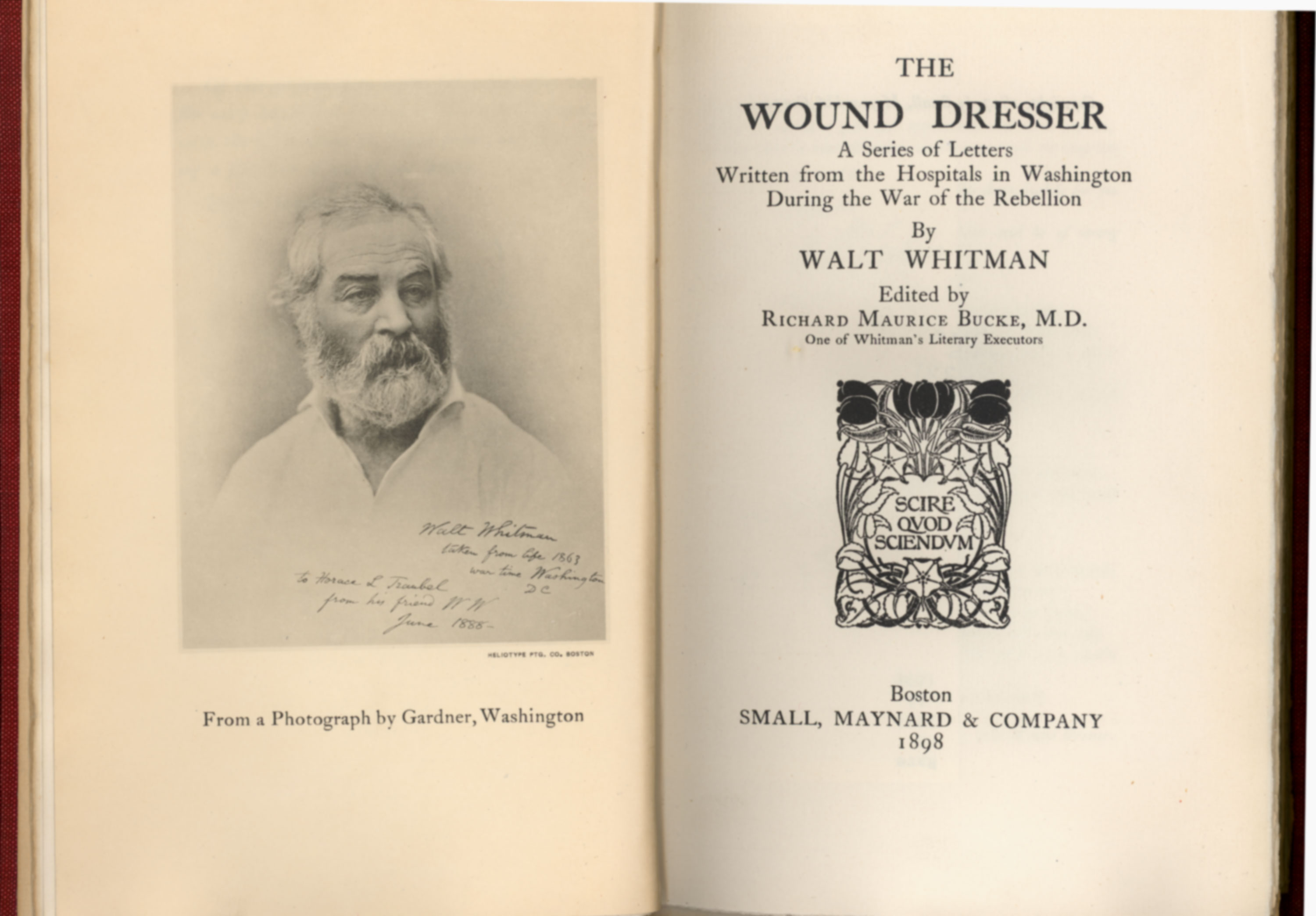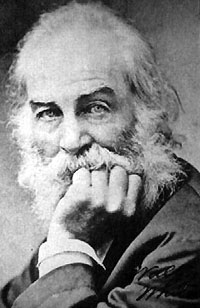|
|
Online Texts for Craig White's Literature Courses
|
|
|
Walt Whitman Selected Poetry The Wound-Dresser 1865 |
Whitman (1819-92) |
Questions: 1. Whitman is too great a poet to pigeonhole, but how may his poetry reflect its time-period of late Romanticism, bordering on early Realism?
2. What characteristics of Whitman's style? Or, how can you tell this is a poem by Walt Whitman?
3. Compare this poem's form as "free verse" or "formal verse" with poems by Poe and Dickinson (and other poems by Whitman). (comparing Poe, Dickinson, Whitman)
![]()
The Wound-Dresser
1
[1.1]
An old man bending I come among new faces,
[1.2]
Years looking backward resuming in answer to children,
[1.3]
Come tell us old man, as from young men and maidens that
love me,
[1.4]
(Arous'd and angry, I'd
thought to beat the alarum, and urge relentless war,
[alarum =
call to arms]
[1.5]
But soon my fingers fail'd me, my face droop'd and I
resign'd myself,
[1.6]
To sit by the
wounded and soothe them, or silently watch the dead;)
[1.7]
Years hence of these scenes, of these furious passions,
these chances,
[1.8]
Of unsurpass'd heroes, (was one side so brave? the other
was equally brave;)
[<equalizing self & other]
[1.9]
Now be witness again, paint the mightiest armies of earth,
[1.10]
Of those armies so rapid so wondrous what saw you to tell
us?
[1.11]
What stays with you latest and
deepest? of curious panics,
[1.12]
Of
hard-fought engagements or sieges tremendous what deepest remains?
2
[2.1]
O maidens
and young men I love and that love me,
[2.2]
What you ask of my days those the strangest and sudden your
talking recalls,
[2.3]
Soldier alert I
arrive after a long march cover'd with sweat and dust,
[<Whitman
adopts dramatic persona]
[2.4]
In the nick of time I come, plunge in the fight, loudly
shout in the
rush of successful charge,
[2.5]
Enter
the captur'd works—yet lo, like a swift-running river they fade,
[works = fortifications]
[2.6]
Pass and are gone they fade—I dwell not on soldiers' perils
or
soldiers' joys,
[2.7]
(Both I remember
well—many the hardships, few the joys, yet I was content.)
[2.8]
But in silence, in dreams' projections,
[2.9]
While the world of gain and appearance and mirth goes on,
[2.10]
So soon what is over forgotten, and waves wash the imprints
off the sand,
[2.11]
With hinged knees
returning I enter the doors, (while for you up there, [hinged = bending >
stooping]
[2.12]
Whoever you are, follow without noise and be of strong
heart.)
[2.13]
Bearing the bandages, water and sponge, [realistic details]
[2.14]
Straight and swift to my wounded I go,
[2.15]
Where they lie on the ground after the battle brought in,
[2.16]
Where their priceless blood reddens the grass the ground,
[2.17]
Or to the rows of the hospital tent, or under the roof'd
hospital,
[2.18]
To the long rows of cots
up and down each side I return,
[realistic details]
[2.19]
To
each and all one after another I draw near, not one do I miss,
[2.20]
An attendant follows holding a tray, he carries a refuse
pail,
[2.21]
Soon to be fill'd with
clotted rags and blood, emptied, and fill'd again.
[2.22]
I onward go, I stop,
[2.23]
With hinged knees and steady hand to dress wounds,
[2.24]
I am firm with each, the pangs are sharp yet unavoidable,
[2.25]
One turns to me his appealing eyes—poor boy! I never knew
you,
[2.26]
Yet I think I could not
refuse this moment to die for you, if that would save you.
3
[3.1]
On, on I
go, (open doors of time! open hospital doors!)
[3.2]
The crush'd head I dress, (poor crazed hand tear not the
bandage away,)
[3.3]
The neck of the
cavalry-man with the bullet through and through examine,
[3.4]
Hard the breathing rattles, quite glazed already the eye,
yet life
struggles hard,
[3.5]
(Come sweet death!
be persuaded O beautiful death!
[3.6]
In
mercy come quickly.)
[3.7]
From the stump of the arm, the amputated hand,
[3.8]
I undo the clotted lint, remove the slough, wash off the
matter and blood,
[3.9]
Back on his
pillow the soldier bends with curv'd neck and side falling head,
[3.10]
His eyes are closed, his face is pale, he dares not look on
the
bloody stump,
[3.11]
And has not yet
look'd on it.
[3.12]
I dress a wound in the side, deep, deep,
[3.13]
But a day or two more, for see the frame all wasted and
sinking,
[3.14]
And the yellow-blue
countenance see.
[3.15]
I dress the perforated shoulder, the foot with the
bullet-wound, [perforated = pierced with holes]
[3.16]
Cleanse the one with
a gnawing and putrid gangrene, so sickening, so offensive,
[3.17]
While the attendant stands behind aside me holding the tray
and pail.
[3.18]
I am faithful, I do not give out,
[3.19]
The fractur'd thigh, the knee, the wound in the abdomen,
[3.20]
These and more I dress with impassive hand, (yet deep in my
breast
a fire, a burning flame.)
4
[4.1]
Thus in
silence in dreams' projections,
[4.2]
Returning, resuming, I thread my way through the hospitals,
[4.3]
The hurt and wounded I pacify with soothing hand,
[4.4]
I sit by the restless all the dark night, some are so
young,
[4.5]
Some suffer so much, I
recall the experience sweet and sad,
[4.6]
(Many a soldier's loving arms about this neck have cross'd
and rested,
[4.7]
Many a soldier's kiss
dwells on these bearded lips).



